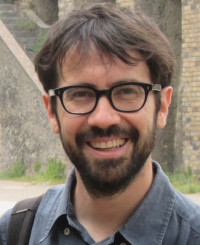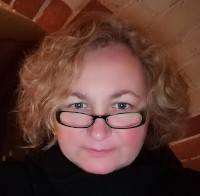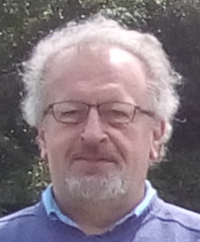Executive election 2021
The online election by members took place between 19th December and 22nd January 2021. 1074 ballots were received from a constituency of 2561 members - a turnout of 42%. This is the largest turnout to-date for EASA.
The results were as follows:

I was elected as EASA exec member on a platform prioritising 1) authorship, exploitation, and teaching-only contracts in big projects 2) recruitment practices of anthropological departments 3) decolonisation of the discipline. Since my election, I was involved in several initiatives with marvellous colleagues working toward these goals. With Martin Fotta (PrecAnthro) and Raluca Pernes we published the EASA Careers Report exposing deepening precarity and divisions in anthropology. Our Brussels AGM2019 on the politics of knowledge production, initiated a dialogue with lobby groups and ERC on the need to rethink authorship, ethics, and hiring politics in the social sciences. With our EASA2020 exec plenary, co-organised with Prem Kumar Rajaram, decolonising and the rise of authoritarianism and new solidarities took center stage in our conference. Continuing my mandate I aim to strengthen EASA’s work on these topics vis-à-vis impending climate and labour crises, and the promises and perils of COVID-19’s ‘digital turn’.
Nominating member: Martin Fotta (Czech Academy of Sciences); Seconded by: Prem Kumar Rajaram (Central European University)

I was educated at the University of Delhi and the New School for Social Research, New York, and have worked since 2003 at the National University of Ireland, Maynooth. Committed both to advocating for anthropology and interrogating its hierarchies, I was the Chair (2016-18) of the World Council of Anthropological Associations when the WCAA came together with the International Union of Anthropological and Ethnological Sciences (IUAES) to create a single bicameral global body, the World Anthropological Union (WAU). My role in the unification process was recognised with the IUAES’ Distinguished Service Award and the American Anthropological Association’s Presidential Award. My writings draw on anthropological political economy and political ecology – see here for details regarding my work and an interview in American Anthropologist exploring my trajectory. I have served on EASA’s Code of Conduct working group (2018-20) and remain convinced of the need for EASA’s critical voice in these difficult times for our discipline and our world.
Nominating member: Ayse Caglar (University of Vienna). Supporting member: Sarah Green (University of Helsinki)

I have been a member of EASA since its inception and keen supporter its activities, including as panel organiser and member of its recent Code-of-Conduct Advisory Group. Until recently my nomadic life prevented me from playing an active role in the association. After graduating from Sussex University, I worked at the European Parliament, Perugia University, Oxford Brookes, and Goldsmiths University where I was professor and Head of Department. In 2003 I moved to Auckland University where I was HoD and founding director of the Europe Institute before returning to London in 2019. As a political anthropologist, I am committed to an engaged, public anthropology that addresses questions of power, policy and exploitation. As an Executive member I would aim to enhance EASA’s standing as a professional association, make it more responsive to grassroots developments throughout Europe, and ensure that its activities reflect and support its members’ needs and interests.
Nominating member: Thomas Hylland Eriksen (University of Oslo); Supporting member: Agathe Mora (University of Sussex)

As an anthropologist working on Europe, its politics and institutions, especially in relation to memory and difficult heritage, I see Europe and anthropological insights – and the work of EASA in speaking and acting for the discipline – as more vital than ever. Having worked for many years in the UK, I am now Professor of Social Anthropology at the Humboldt-Universität zu Berlin (www.carmah.berlin). This, together with working with colleagues across Europe, has made me very aware of the various systems and predicaments faced. I have extensive experience of many aspects of academic work, including in devising new programmes and protocols (e.g. ethics, publishing, climate responsibility), and have held a variety of leadership roles, as well as contributing to team efforts. I am committed to supporting early-career scholars, diversification, building flourishing research environments, improving working conditions and anthropology having a public voice. I am keen to support EASA however I can.
Nominating Member: Sarah Green (University of Helsinki); Supporting Member: Elsa Peralta (University of Lisbon)

I am a long-standing member of EASA and co-co-ordinator of the PACSA network (peace and conflict studies network). As an anthropologist of displacement based in Queen’s University Belfast, I work closely on asylum seeker and refugee issues and Indigenous Australian politics with a thematic focus on conflict, loss and reparation. I am programme director for a large conflict transformation and social justice master’s programme in QUB. I have a particular passion for public and applied anthropology. Having worked for a number of years in business school and marketing settings, I am active in the development of pedagogical opportunities in the spaces of business, design and policy anthropology. If elected to the EASA executive board, I would work towards further expanding the public visibility of anthropology in new and experimental forms. I see the role of social media formats as playing a key role here. Much of my interest in expanding the role of anthropology, in rethinking collaboration and application, stems from my personal experience of precarity. As such, I would see my role on the executive committee as embracing of creativities and expansion whilst always working in solidarity with attempts to address the urgent issue of precarity.
Nominating member: Evropi Chatzipanagiotidou (Queens University Belfast); Supporting member: Katja Seidel (Maynooth University)

Currently a postdoctoral associate at the University of Leuven, I am an anthropologist, teacher and writer. My research focuses on the intersections of knowledge, affect and capital in the making of policies and bureaucracies. As an anthropologist of the EU, I would combine my understanding of EU institutions with advocacy efforts for EASA to diminish the existing contradictions in funding schemes (that further precarity, exploitation, and coloniality). Also, I would steer EASA to engage more deeply into decolonizing and unthinking the anthropological perspective. As an early-career academic involved in PrecAnthro, I am committed to its mission of addressing academic precarity and the role of universities and funding bodies in reproducing intersectional inequalities. Teaching should be more valorized, both in EASA and in anthropology. Moreover, I have been deeply troubled and affected by the rising mental health crisis in universities. Instead of tolerating and privatizing the rising rates of depression, anxiety, burn-out and mental distress for staff and students alike, I propose we (re)politicize it and place it firmly on EASA's agenda. If elected, I commit to work on: academic precarity, mental health, revalorizing teaching, decolonizing the discipline, and reimagining funding regulations.
Nominating member: Mariya Ivancheva (University of Liverpool); Supporting member: Martin Fotta (Czech Academy of Sciences)

I am research fellow at CRIA, Iscte-Instituto Universitário de Lisboa. I was trained in Italy and I have worked in Spain, before moving to Portugal, while doing field research in Italy, Greece, Albania, and Portugal. EASA has contributed to our understanding of anthropology, creating an inclusive, multilingual scholarly space, where different ways of doing anthropology beautifully flourished and debated together. Today, I believe EASA is called to play a new crucial role in strengthening the public dimension of anthropology, promoting and communicating its unique way of understanding social life and its fast-changing configurations in these troubled times. If elected I would be particularly concerned with making anthropological research and knowledge more open, accessible, and just, promoting shared platforms, and open access editorial initiatives. I think an important contribution might be offered by the EASA networks, an incredible fortune of persons, ideas, and projects that await to be carefully cultivated in order to let EASA flourish.
Nominating member: Valeria Siniscalchi (EHESS, Centre Norbert Elias); Supporting member: Susana Narotzky (Universitat de Barcelona)

I stand for this election because I believe in the important role of transnational independent scholarly societies. My experience of different academic systems within Europe (Poland, Germany, UK, Russia) taught me that anthropologists, especially as employees of particular institutions, are confronted with divergent national systems of academic governance, hence experiencing diverse kinds of pressures. In extreme cases, they have to fight for the recognition of their discipline as an academic field, as it happened in Poland. EASA has to take those differences into account while thinking about the association’s strategies and goals.
My research on how governing regimes shape and are shaped by people’s actions is also relevant. My main field of research is the anthropology of religion, constructed very broadly. I look at how the realm of life, which for many people is one of emotional and extraordinary engagements, is shaped by particular organizational regimes.
Nominating member: Jeanne Kormina (Higher School of Economics in St Petersburg); Seconded by: Alexandra Schwell (University of Klagenfurt)

I hope that my international experience, combined with interest in “Other Peoples’ Anthropologies” (edited book published in 2008), and more recently in the implications of “Anthropocene” and human rationality could strengthen the Executive. During two decades in EASA, I co-founded (with Han Vermeulen) History of Anthropology Network, and was EASA Book Series Editor (2016-2020).
I am Professor of anthropology at the University of Belgrade (Serbia), and at the University of Donja Gorica (Montenegro). Previously taught at the Faculty of Social Sciences, University of Ljubljana (Slovenia), University of Brasília (Brazil), Rhodes University, Witwatersrand (South Africa), and University of St Andrews (UK). I was Deputy Chair of the Commission on Theoretical Anthropology (COTA) of the IUAES, and member of the Council of Commissions (2013-2018). I spoke on different social and political issues, and actively work with human rights organisations since 1993.
Nominating member: Adam Kuper (LSE); Supporting member: Maja Petrović-Šteger (Institute of Anthropological and Spatial Studies, ZRC SAZU, Ljubljana)

I am Assistant Professor at the Institute for Anthropology and Ethnology at Adam-Mickiewicz-University, Poznań and Teaching Fellow at the School of Architecture Manchester. I am the founder of FairerTales, a producer of experimental, inclusive cultural formats. My PhD thesis concerned tourism in post-German, post-cold War Northeast Poland. Current research interests are longing, power and architecture, anthropology of doubt, cultural activism and storytelling. I advocate methodological experimentation and diverse forms of knowledge representation. I have realised an AHRC research grant on wellbeing and support of Early Career Researchers in Manchester, and designed academic writing and collaboration workshops for colleagues. As member of the teaching board at Poznań, I contributed to the innovation of the Masters Programme in Ethnology and Anthropology that received the National Teaching Excellence Award (UJ) in 2020.
I will put my transnational work experience to use for fostering solidarity, wellbeing and collaborations in the EASA members community and for bringing anthropological knowledge closer to relevant audiences.
Nominating member: Adam Kuper (LSE); Supporting member: Michal Buchowski (Adam Mickiewicz University, Poznań)

I believe that EASA is the best meeting-platform available to defend independent scholarship and support initiatives to reach new publics beyond academia. Over the course of my term, I’ll pay equal attention to the knowledge-making practices at the periphery of the discipline and the need to repair our epistemic tools in order to shift our ways of doing things from managing abundance to answering to precarity, and from textual ethnographies to reconsidering multimodal, collaborative, and experimental formats.
Currently, I lead a research project entitled “Europeanisation through Repair” at Tallinn University. I have also published in different languages and curated diverse exhibitions. I’m familiar with the EASA’s diverse operations, including the young scholar award, as well as with a number of European peripheries and with the work of the emerging generation of anthropologists. It is important to note that EASA integrates other ways of inhabiting academia at its core while working centrifugally, not just centripetally.
Nominating member: Miia Halme-Tuomisaari (Lund University); Supporting member: Chiara Pussetti (University of Lisbon)
The new executive (2021-2023) will thus be comprised of Monica Heintz (Secretary), David Mills (Treasurer), Mariya Ivancheva, Chandana Mathur, Cris Shore, Sharon Macdonald and Fiona Murphy.






